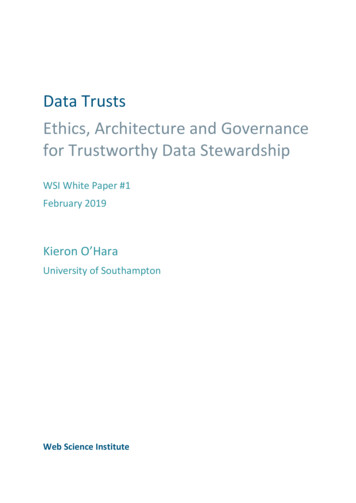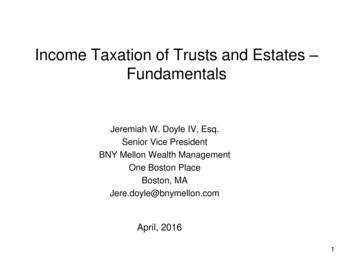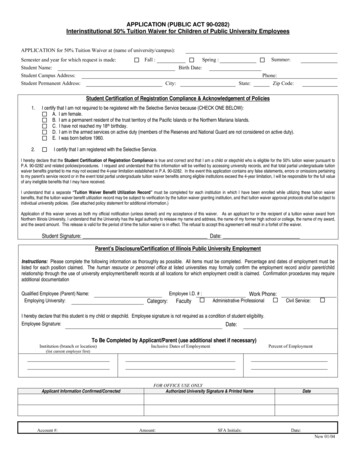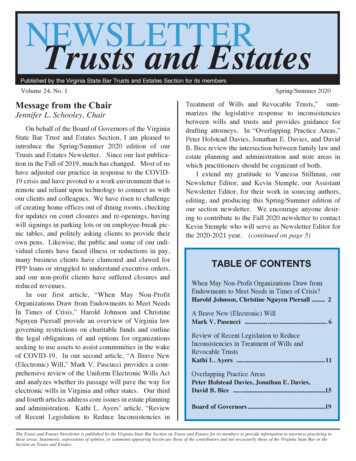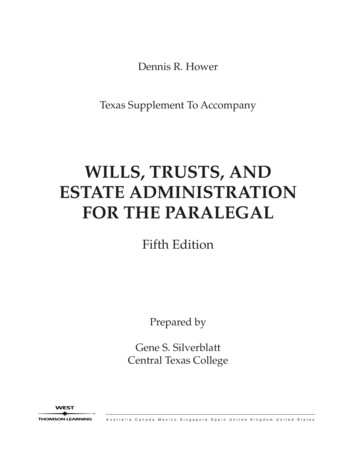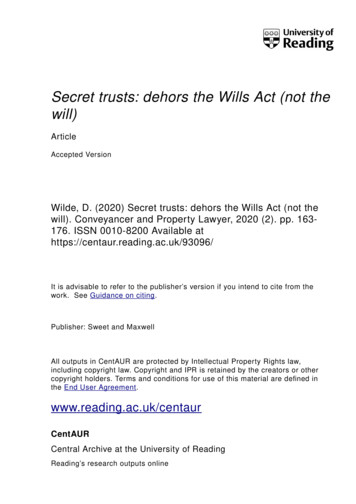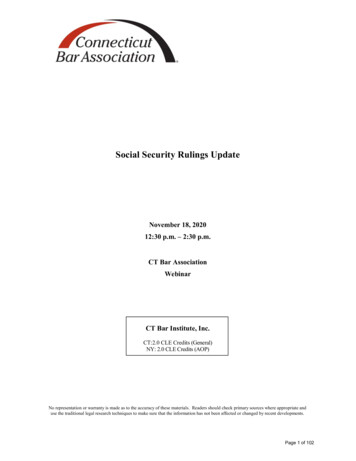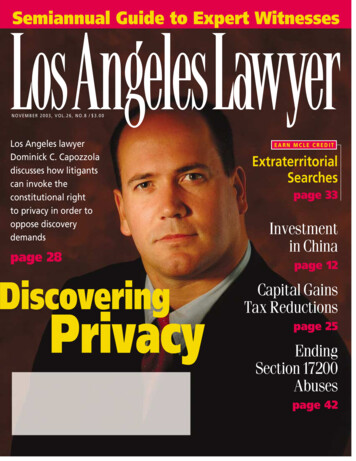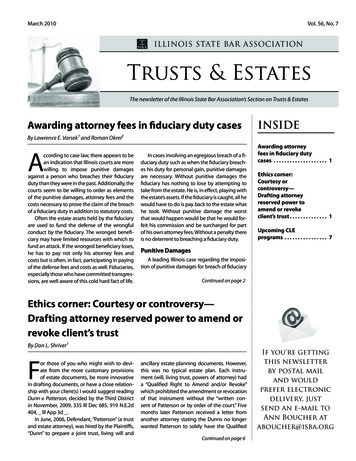
Transcription
March 2010Vol. 56, No. 7Illinois State Bar AssociationTrusts & EstatesThe newsletter of the Illinois State Bar Association’s Section on Trusts & EstatesAwarding attorney fees in fiduciary duty casesInsideBy Lawrence E. Varsek1 and Roman Okrei2According to case law, there appears to bean indication that Illinois courts are morewilling to impose punitive damagesagainst a person who breaches their fiduciaryduty than they were in the past. Additionally, thecourts seem to be willing to order as elementsof the punitive damages, attorney fees and thecosts necessary to prove the claim of the breachof a fiduciary duty in addition to statutory costs.Often the estate assets held by the fiduciaryare used to fund the defense of the wrongfulconduct by the fiduciary. The wronged beneficiary may have limited resources with which tofund an attack. If the wronged beneficiary loses,he has to pay not only his attorney fees andcosts but is often, in fact, participating in payingof the defense fees and costs as well. Fiduciaries,especially those who have committed transgressions, are well aware of this cold hard fact of life.In cases involving an egregious breach of a fiduciary duty such as when the fiduciary breaches his duty for personal gain, punitive damagesare necessary. Without punitive damages thefiduciary has nothing to lose by attempting totake from the estate. He is, in effect, playing withthe estate’s assets. If the fiduciary is caught, all hewould have to do is pay back to the estate whathe took. Without punitive damage the worstthat would happen would be that he would forfeit his commission and be surcharged for partof his own attorney fees. Without a penalty thereis no deterrent to breaching a fiduciary duty.Awarding attorneyfees in fiduciary dutycases . . . . . . . . . . . . . . . . . . . . . 1Ethics corner:Courtesy orcontroversy—Drafting attorneyreserved power toamend or revokeclient’s trust. . . . . . . . . . . . . . . 1Upcoming CLEprograms. . . . . . . . . . . . . . . . . 7Punitive DamagesA leading Illinois case regarding the imposition of punitive damages for breach of fiduciaryContinued on page 2Ethics corner: Courtesy or controversy—Drafting attorney reserved power to amend orrevoke client’s trustBy Don L. Shriver1For those of you who might wish to deviate from the more customary provisionsof estate documents, be more innovativein drafting documents, or have a close relationship with your client(s) I would suggest readingDunn v. Patterson, decided by the Third Districtin November, 2009, 335 Ill Dec 685, 919 N.E.2d404, Ill App 3d .In June, 2006, Defendant, “Patterson” (a trustand estate attorney), was hired by the Plaintiffs,“Dunn” to prepare a joint trust, living will andancillary estate planning documents. However,this was no typical estate plan. Each instrument (will, living trust, powers of attorney) hada “Qualified Right to Amend and/or Revoke”which prohibited the amendment or revocationof that instrument without the “written consent of Patterson or by order of the court.” Fivemonths later Patterson received a letter fromanother attorney stating the Dunns no longerwanted Patterson to solely have the QualifiedContinued on page 6If you're gettingthis newsletterby postal mailand wouldprefer electronicdelivery, justsend an e-mail toAnn Boucher ataboucher@isba.org
Trusts & Estates March 2010, Vol. 56, No. 7Awarding attorney fees in fiduciary duty casesContinued from page 1duty is the Estate of Wernick, 127 Ill.2d 61, 525N.E.2d 876 (1989). In Wernick the plaintiff’sdecedent and the defendant were longtimefriends and business associates investing inreal estate together. The decedent handledthe partnership’s accounting matters andpracticed medicine, and the defendanthandled the other business matters andpracticed law. The decedent became terminally ill. Arrangements were made by thetwo partners for the defendant to buy outthe interests of the decedent. The SupremeCourt ultimately affirmed that the defendantowed a fiduciary duty to the decedent andthat that duty was breached. What were thefacts that warranted a finding of a breach ofa fiduciary duty?In Wernick the defendant purchased theproperty from the decedent prior to hisdeath at substantially less than it was worth.He then resold the property retaining theproceeds of sale for his own benefit. He alsodelayed in repaying a promissory note hegave the decedent in exchange for the titleto the property. The Wernick case held thatpunitive damages were appropriate and thecosts of litigation, including attorney fees,were an element of punitive damages to beconsidered.The Supreme Court in Wernick recited thefundamental law of punitive damages andstated: “the purpose of punitive damagesis twofold: to punish the wrongdoer and todeter the particular wrongdoer as well asothers from committing similar attacks in thefuture.” IPI 35.01 uses similar language whenit instructs juries, “in addition to any otherdamages to which you find the plaintiff entitled, award an amount which will serve topunish the defendant and to deter the defendant and others from similar conduct.”The Wernick court points out that punitivedamages may be awarded in cases wherethe wrongful act complained of is characterized by wantonness, malice, oppressionor other circumstances of aggravation. Thecourt makes note of the fact that the pattern of conduct by the defendant was fromthe inception motivated by more than mereignorance or oversight but by personal gain.In Wernick the Supreme Court cited withfavor the case of Glass v. Burkett, 64 Ill.App.3d676 381 N.E.2d 821 (1978), referred to below,and quoted the favor the following of Glass: the defendant’s conduct was intentional, was not in good faith, andwas performed with full knowledgethat the loss to his client would be tohis gain.Another case involving the breach ofa fiduciary duty is In re: Estate of Hoellen, adisabled person, v. Donald L. Owsley, 367 Ill.App.3d 240, 854 N.E.2d 774, 305 Ill.Dec. 182(1st Dist. 2006).In Hoellen a police officer gained the trustof an 89 year old senior citizen. The policeofficer made himself the beneficiary of thesenior citizen’s assets. Someone blew thewhistle, a public guardian was appointed,and the police office was served with a citation through probate court proceedings. Anorder was issued returning assets that weretransferred, removing the police officer’sname from any powers of attorney that weresigned, and removing him as a beneficiaryof any trusts and wills that the 89 year oldhad. Additionally, the trial court entered 1in nominal damages and 50,000 in punitivedamages. The appellate court affirmed andstated:We conclude that the probatecourt did not error in finding that respondent’s conduct justified an awardfor punitive damages where he usedhis position as a Chicago Police Officer to gain Hoellen’s trust and confidence, exert undue influence overhim and then flagrantly and intentionally breach the fiduciary duty that heowed him.Reimbursement of Petitioner’sCosts of Litigation and AttorneyFeesThe case of Glass v. Burkett, 64 Ill.App.3d676, 381 N.E.2d 821 (1978), stands for theproposition that under certain circumstances attorney fee can be considered as one element of punitive damages. As stated abovein Glass, a realtor was found to be in violation of his fiduciary duties when he steeredpotential buyers away so that he could purchase the property for himself and resell it ata considerable profit. The court found thatthe concealment by the realtor of potentialpurchasers was intentional, not in good faith2and intended to be for his personal gain. Itconcluded that the conduct fulfilled the requirement of aggravated circumstances soas to warrant punitive damages. The Glasscourt concluded that under the circumstances it was not an abuse of the trial court’s discretion to award attorney fees as an elementof punitive damages. The court stated,Wrongful conduct of the defendant which has been characterized asbeing either willful, wanton, malicious,or oppressive is the root of all caseswhere litigation expenses have beenallowed as an exception to the generalrule that litigation expenses are not allowable to the successful party in theabsence of a statute or in the absenceof some agreement or stipulation specifically authorizing them.64 Ill.App.3d at 683.In Re: Estate of Thomas Talty, 376 Ill.App.3d1082, 877 N.E.2d 1195, 315 Ill.Dec. 866, petition for cert denied at 226 Ill.2d 615, 882N.E.2d 77, 317 Ill.Dec. 503 (2008), stands as awarning to those executors, administratorsand guardians who choose to benefit themselves disregarding their obligations to thosethey are appointed to protect. For attorneys,it provides an outline of potential theories ofrecovery for breach of fiduciary duty including the recovery of attorney fees and costs oflitigation.The will of Thomas Talty was admittedto probate in Will County, and his brother,William, was appointed executor. Thomas’widow was his only heir and the only residuary beneficiary under the will. Thomas andWilliam each owned 50 percent of the stockof an auto dealership and were also 50/50co-owners of the building and acreage inwhich the business was located. The brothers had also entered into a stock redemptionagreement which provided that the surviving brother had the option to purchase thedeceased brother’s shares at market value asdetermined by appraisal. A similar provisionwas provided as to the land.William Talty wore three hats. As executorhe was the seller. William Talty, as the surviving partner, was the buyer. Pursuant to thestock redemption agreement, William wasthe person who could determine the saleprice by appraisal.
March 2010, Vol. 56, No. 7 William hired an accountant, his cousin, toappraise the business. He valued Thomas’ 50percent interest in the business. The widowbecame aware of the pending sale by herbrother-in-law to himself and attempted toenjoin the transfer. The court refused the injunction on the grounds that she had a suitfor damages as an adequate remedy at law.The sale of the business and the sale of thereal estate to William was completed. Shortlythereafter a supplemental proceeding alleging breach of fiduciary duty was filed.After litigation commenced, William hadhis appraisal reduced by 50 percent in a newappraisal. On cross-examination the accountant testified that he reduced the appraisalat the request of William Talty. The trial courtfound the real estate appraiser hired by William “to be the worst expert witness the courthad heard in 28 years on the bench.”William Talty testified that he did notconsult with the widow or keep her advisedeven though she was the only residuary legatee. On the stand he repeatedly stated, “theagreement did not require it.”During the course of the litigation William obtained a second appraisal which wasmore favorable to the widow’s position. Hesecreted this appraisal for over two years repeatedly denying its existence in requests toadmit, interrogatories and at his deposition.The appraisal was turned over to plaintiff’scounsel as soon as his new attorney becameaware of it.The trial court found that William failedin his duty of full disclosure to the widowand that the failure to disclose gave rise toan interference of bad faith. William failedto disclose the second appraisal, used a realestate appraiser that he knew, or reasonablyshould have known, was not qualified, andparticipated with his cousin in revising thebusiness appraisal to his own advantage. Thetrial court ordered that William pay to the petitioner her attorney fees, litigation costs andexpert witness fees as punitive damages. TheAppellate Court affirmed and the SupremeCourt denied a petition for leave to appeal.ConclusionSince 1978 in the case of Glass v. Burkett,and to date with In re: Talty, Illinois courtshave made clear that they will enter anaward against a person who breaches his fiduciary duty when that person benefits fromthe breach and causes harm to the party orparties to which they owe a fiduciary duty.The imposition of punitive damages createda real deterrent to such breaches and awarding attorney fees and litigation costs to theprevailing party will likely act as an additional deterrent. 1. Lawrence (“Larry”) Varsek may be reachedat (815) 744-3323 or at Kesrav@aol.com. Larryis a member of the ISBA Trusts & Estates SectionCouncil.2. Roman Okrei may be reached at (815) 8349410.WNow Every Article Isthe Start of a DiscussionIf you’re an ISBA member,you can comment on articlesin the online versionof this newsletterVisitto access the archives.ondering whethera case has beencovered in an ISBAnewsletter? Just curious to seewhat’s been publishedrecently?Check out the indexes of everyarticle the ISBA has producedsince 1993 at www.isba.org/publications/sectionnewsletters .And if you want to order a copyof any article, just call or e-mailJanice Ishmael at 217-5251760 (ext. 1456) orjishmael@isba.org3Trusts & EstatesTrusts & EstatesPublished at least four times per year.Annual subscription rate for ISBAmembers: 20.To subscribe, visit www.isba.orgor call 217-525-1760OfficeIllinois Bar Center424 S. Second StreetSpringfield, IL 62701Phones: 217-525-1760 OR 800-252-8908www.isba.orgEditorKatarinna McBride161 N. Clark St., Ste. 2600Chicago, IL 60601-3221Managing Editor/ProductionKatie Underwoodkunderwood@isba.orgTrusts & Estates SectionCouncilMary D. Cascino, ChairJanet L. Grove, Vice ChairRay Koenig III, SecretaryMichael C. Wiedel, Ex-OfficioCharles G. BrownDeborah B. ColeTracy S. DaltonIrene C. DavidDarrell E. DiesMary C. DownieReynolds E. EverettMary E. FaupelJacob J. FrostGregg A. GarofaloJay S. GoldenbergFranklin M. HartzellThayer J. HerteEdward Jarot Jr.Justin J. KarubasRobert W. KaufmanPhilip E. KoenigKatarinna McBridePaul A. MeintsRichard P. MillerDonna L. MooreDennis A. NordenDwight H. O’KeefeWilliam A. PeithmannThomas A. PolachekDonald L. ShriverSara J. SiddiqiMichael R. StetlerDavid C. ThiesLawrence E. VarsekRobert WeberLyman W. WelchBernard Wysocki, Board LiaisonMary M. Grant, Staff LiaisonSteven A. Andersson, CLE Committee LiaisonDisclaimer: This newsletter is for subscribers’ personal use only; redistribution is prohibited. CopyrightIllinois State Bar Association. Statements or expressionsof opinion appearing herein are those of the authorsand not necessarily those of the Association or Editors,and likewise the publication of any advertisement is notto be construed as an endorsement of the product orservice offered unless it is specifically stated in the adthat there is such approval or endorsement.Articles are prepared as an educational service tomembers of ISBA. They should not be relied upon as asubstitute for individual legal research.The articles in this newsletter are not intended to beused and may not be relied on for penalty avoidance.Postmaster: Please send address changes to theIllinois State Bar Association, 424 S. 2nd St., Springfield,IL 62701-1779.
Trusts & Estates March 2010, Vol. 56, No. 7Understanding the BAPCPA:Bankruptcy Abuse Preventionand Consumer Protection ActGet a Head Starton the newBankruptcy Code!Understanding theBAPCPABankruptcy Abuse Preventionand Consumer Protection ActThis book brings together previously published BAPCPA articles to giveyou a better understanding of bankruptcy law, conveniently compiledinto one information-packed book. You’ll find articles with insights intopre-filing issues, the means test, procedure, abuse, and other information that will be helpful to any attorney practicing bankruptcy law.There are step-by-step instructions on how to prepare a petition, whereto find financial counseling for clients, and documents needed beforethe petition is filed.These articles are written by some of Illinois’ foremost authorities on thenew bankruptcy law.Need it NOW?Also available as one of ISBA’s FastBooks. View or download a pdf immediately using a major credit card at the URL below.FastBooks prices:Understanding the BAPCPA 19.50 Members/ 29.50 Non-MembersOrder at www.isba.org/bookstore or by callingJanice at 800-252-8908Understanding the BAPCPA: Bankruptcy AbusePrevention and Consumer Protection Act 22 Member/ 32 Non-MemberIllinois has a history ofsome pretty good lawyers.We’re out to keep it that way.(includes tax and shipping)THENFor years I took great pride in drafting my own documents usingmy word processor.Then I learned how WealthDocx could improve my draftingefficiency and increase my profitability. The time I save allows meto see twice the number of clients I used to see.NOWToday, my new partner and I appreciate the new strategies andimprovements in WealthDocx. We are using its new DomesticAsset Protection Trust module to serve the asset protection needsof physicians, dentists and other high-risk business clients. For more information,call 1-888-659-4069, ext. 819WealthCounsel is a registered trademarkof WealthCounsel, LLCView our WealthDocx demo at www.wealthcounsel.com4Powered by WealthDocx 7 Access Our Free Resources Library
March 2010, Vol. 56, No. 7 Another Policy Holder 8x10 Greyscale.pdf12/29/09Trusts & Estates12:08:59 73-4722www.isbamutual.com5
Trusts & Estates March 2010, Vol. 56, No. 7Courtesy or controversy—Drafting attorney reserved power to amend or revoke client’s trustContinued from page 1Right and that it should be removed from theinstruments. Patterson responded that hewould like to meet with the Dunns personally to determine if this was consistent withtheir original plan. If they refused to meet,Patterson stated the Dunns would need topetition the Court.The Dunns sought an immediate Declaratory Judgment stating that they had an unfettered right to amend and Patterson mustabide by their wishes under Rule 1.2(a) of theRules of Professional Conduct (134 Ill.2d R.1.2(a)). Patterson vigorously defended andcited, as part of his defense, to Rules 1.14((a)and (b)) (134 Ill.2d Rs. 1.14(a) and (b)) because he believed that Mrs. Dunn’s mentalstatus may have been impaired. The Dunnsalso filed a Rule 137 motion for sanctionsclaiming “a reasonable attorney would nothave adopted and forwarded the argumentspresented by defendant.” The trial courtfound for the Dunns and sanctioned Patterson in the amount of the Dunn’s legal feesand costs. Patterson appealed. The appellatecourt reversed and remanded.Patterson relied on sections of Restatement (Third) of Trusts § 63(1) and commentj to § 63(3) which approves the concept ofhaving a third party consent for the exerciseof the amendment or revocation power intrusts. The Dunns acknowledged this butargued that an attorney is held to a higherstandard and under Rule 1.2, because publicpolicy requires an attorney to follow the direction of its clients.The court distinguished Sherman v. Klopfer, 32 Ill App. 3d 519,336 N.E. 219 (1975) sincein that case the attorney failed to adequatelyinform the client that he stood to benefitfrom the transaction. The court agreed withPatterson that the consent was “consistentwith the broad fiduciary duties an attorneyowes, . which is based on duties of loyaltyand trust” and the court accepted Patterson‘sargument that even though he may be discharged as the Dunns’ attorney, this wouldnot limit his role to approve or deny the “consent on a good-faith basis.” The court specifically noted that Patterson had no beneficialinterests and had no relationship with anyother family members.Furthermore, the court commented thattheir decision might be different if the draft-ing attorney was a metropolitan or urbanattorney rather than a rural practitioner. Thecourt stated:Out here in the cornfields of Illinoisand, we suspect, sometimes in thelarge metropolitan areas of Illinois,one’s lawyer is often his or her mosttrusted friend and advisor with respectto major life decisions. Where, as here,the lawyer is given no financial stakein an estate by virtue of his capacity asa fiduciary, we see no reason why thefamily lawyer cannot act in such capacity simply because he is drafting atrust document.Finally, the court reversed the sanctions.After citing Rule 137, the court found thatthere was nothing unreasonable about Patterson’s conduct either in drafting the docu-6ments or later when his consent was broughtinto question. The court did not delineatewhat “pleading, motion or other paper” wasclaimed to be in violation of the Rule.The court concluded:We do not find Patterson’s conductsanctionable. Rather, we find it admirable and consistent with the highestideals of the bar.If you are practicing in the “cornfields” ofIllinois, the close relationship you have withyour clients may be ample explanation forsome uncustomary fiduciary relationships,which may or may not fly in the big city. 1. Donald L. Shriver, Law Offices of Shriver,O’Neill & Thompson and his offices are located at515 North Court Street Rockford, Illinois 611036807. You may call him at 815-963-4895.
March 2010, Vol. 56, No. 7 Trusts & EstatesUpcoming CLE programsTo register, go to www.isba.org/cle or call the ISBA registrar at 800-252-8908 or 217-525-1760.AprilThursday, 4/1/10 – Webinar. AdvancedResearch on FastCase. Presented by the Illinois State Bar Association. *An exclusivemember benefit provided by ISBA and ISBAMutual. Register at: https://www1.gotomeeting.com/register/458393744 . 12-1.Thursday,4/8/10Webcast—Durable Powers of Attorney. Presented bythe Illinois State Bar Association. ?seminar 3564 . 12-1.Thursday, 4/8/10- Springfield, INBBuilding 307 E. Jackson. Key Issues in Local Government Law: A Look at FOIA, OMA,Elections and Attorney Conflicts. Presentedby the ISBA Local Government Law Section& the ISBA Standing Committee on Government Lawyers. 12:30-4:45. Cap 55Thursday, 4/8/10- Chicago, ISBA Regional Office—Resolving Financial Issuesin Family Law Cases. Presented by the ISBAFamily Law Section. 8:30-4:30.Friday, 4/9/10- Chicago, ISBA RegionalOffice—Civil Practice Update- 2010. Presented by the ISBA Civil Practice Section. 9-4.Monday - Friday, 4/12/10 - 4/16/10 –Chicago, ISBA Regional Office—40 hourMediation/Arbitration Training. Master SeriesPresented by the Illinois State Bar Associationand the ISBA Alternative Dispute ResolutionSection. 8:30-5:45 each day.Friday, 4/16/10- Chicago, ISBA Regional Office—Legal Trends for Non-Techies:Topics, Trends, and Tips to Help Your Practice.Presented by the ISBA Committee on LegalTechnology ; co-sponsored by the ISBA ElderLaw Section. 1-4:30 p.m.Saturday, 4/17/10 – Lombard, LindnerLearning Center—DUI, Traffic, and Secretary of State Related Issues- 2010. Presentedby the ISBA Traffic Law Section. 9-4. Cap 250.Tuesday, 4/20/10- Bloomington, Double Tree Hotel—Intellectual Property Coun-sel from Start-up to IPO. Presented by theISBA Intellectual Property Section. 8:30-3:30.Cap 80.dard Club—Tips of the Trade: A Federal CivilPractice Seminar. Presented by the ISBA Federal Civil Practice Section. 9-4:30.Wednesday, 4/21/10- Bloomington,Double Tree Hotel—Construction LawWhat’s New in 2010? Presented by the ISBASpecial Committee on Construction Law; cosponsored by the ISBA Special Committee onReal Estate Law. 9-4. Cap 80.Thursday, 5/6/10 – Chicago, ISBA Regional Office—Law Practice Strategies toWeather a Stormy Economy. Master SeriesPresented by the Illinois State Bar Association. 8:30-12:45.Friday, 4/23/10- Champaign, I- Hoteland Conference Center—Practice Tips &Pointers on Child-Related Issues. Presentedby the ISBA Child Law Section; co-sponsoredby the ISBA Family Law Section. 8:25-4. Cap70.Tuesday, 4/27/10- Chicago, ISBA Regional Office—Construction Law- What’sNew in 2010? Presented by the ISBA SpecialCommittee on Construction Law. 9-4.Wednesday, 4/28/10- Chicago, ISBA Regional Office—Intellectual Property Counsel from Start-up to IPO. Presented by theISBA Intellectual Property Section. 8:30-3:30.Thursday, 4/29/10- Chicago, ISBA Regional Office—Key Issues in Local Government Law: A Look at FOIA, OMA, Electionsand Attorney Conflicts. Presented by theISBA Local Government Law Section & theISBA Standing Committee on GovernmentLawyers. 12:30-4:45.Friday, 4/30/10- Chicago, ISBA Regional Office—Anatomy of a Trial. Presented bythe ISBA Tort Law Section. Time TBD.MayTuesday, 5/4/10- Chicago, ISBA Regional Office—Boot Camp- Basic Estate Planning. Presented by the ISBA Trust and EstatesSection. 9-4.Wednesday, 5/5/10- Chicago, ISBA Regional Office—Price Discrimination: Deador Alive? Robinson Patman after Feesers.Presented by the ISBA Antitrust Section. 122pm.Wednesday, 5/5/10- Chicago, The Stan7Friday, 5/7/10 – Bloomington, Bloomington-Normal Marriott—Law PracticeStrategies to Weather a Stormy Economy.Master Series Presented by the Illinois StateBar Association. 8:30- 12:45. Cap 130.Friday, 5/7/10- Bloomington, Bloomington-Normal Marriott—DUI, Traffic andSecretary of State Related Issues-2010. Presented by the ISBA Traffic Laws/ Courts Section. Time TBD. Cap 125.Wednesday, 5/12/10- Chicago, ISBA Regional Office—Mental Health Treatment inIllinois: Time for a Change. Presented by theISBA Committee on Mental Health Law. TimeTBD.Thursday, 5/13/10- Friday, 5/14/10Chicago, ISBA Regional Office—2010Annual Environmental Law Conference.Presented by the ISBA Environmental LawSection. 8:30-5; 8:30-12:15.Friday, 5/14/10- Chicago, ISBA Regional Office—Legal Ethics in Corporate Law.Presented by the ISBA Corporate Law Department Section. 1-5:15.Thursday, 5/20/10- Bloomington, Hawthorn Suites—Resolving Financial Issuesin Family Law Cases. Presented by the ISBAFamily Law Section. 8:30-4:30.Friday, 5/21/10- Chicago, ISBA Regional Office—2010 Labor and Employment Litigation Update. Presented by the ISBA Laborand Employment Section. 9-12:30.JuneFriday, 6/11/10- Live Webcast—SecondAnnual Animal Law Conference. Presentedby the ISBA Animal Law Section. 8-5.
IllInoIs ClIent IntervIew formsuriew YoInter v s theClient y!aeasy wNew and improved forms to help keep you focused while interviewingnew clients. Add to or delete information from the forms so that theyconform to your personal choice of interview questions. Use them on yourcomputer while interviewing, or print them out before the interview. Thisis the Third Edition of these forms which have been revised in accordancewith suggestions from attorneys who have used our old forms. There are 28basic forms covering family law, estates and wills, real estate, incorporation,DUI, power of attorney, personal injury, and other subjects. A valuable toolfor any attorney, keeping your client files uniform.Forms are available on a compact disc (compatible with Word or WordPerfect). Compiled by members of the ISBA General Practice Section Council,and edited by Timothy E. Duggan. 25 members/ 35 nonmembers.need it now?Also available as one of ISBA’s FastBooks.View or download a pdf immediately usinga major credit card at the URL below.FastBooks prices:Illinois Client Interview Forms 22.50 Members/ 32.50 Non-MembersMicrosoft Word& WordPerfectFormatDocumentsCDIllinois Client Interview Forms3rd Edition – 2008 UpdateChris Freese – Editor (1st Edition)Timothy E. Duggan – Editor (2008 Update)Prepared on May 1, 2008Order at www.isba.org/bookstore or by callingJanice at 800-252-8908Illinois Client Interview Forms 25 Member/ 35 Non-Member(includes tax and shipping)Illinois has a history ofsome pretty good lawyers.We’re out to keep it that way.Vol. 56 No. 7March 2010Illinois Bar CenterSpringfield, Illinois 62701-1779Trusts & EstatesNon-Profit Org.U.S. POSTAGEPAIDSpringfield, Ill.Permit No. 820
March 2010, Vol. 56, No. 7 Trusts & Estates Trusts & estates Published at least four times per year. Annual subscription rate for ISBA members: 20. To subscribe, visit www.isba.org or call 217-525-1760 office Illinois Bar Center 424 S. Second Street Springfield, IL 62701 Phones: 217-525-1760 OR 800-252-8908 www.isba.org Editor Katarinna McBride


